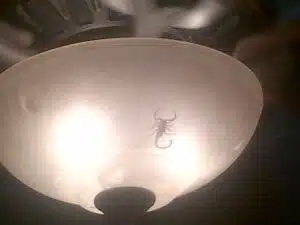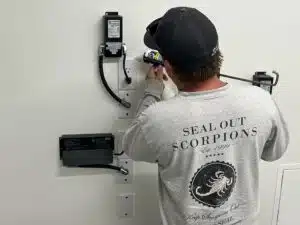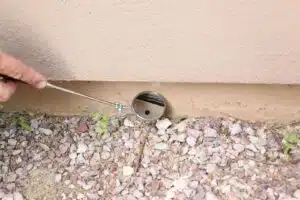Why Seeing One Scorpion In Your Home Could Mean Much Bigger Problems
When you spot a scorpion inside your home, it’s natural to panic. The instinct is to reach for the spray and make it disappear. After all, no one wants the unsettling thought of scorpions lurking in the shadows. But here’s the thing: when you see one scorpion, it’s not just a pest, it’s a clue. It’s telling you something about the vulnerabilities in your home’s structure that may be invisible to the untrained eye. Ignoring that message can lead to more sightings and bigger issues down the line.
In our experience, a single scorpion sighting often isn’t the root problem, it’s the symptom. A quick spray might provide temporary relief, but without addressing the core issue, the scorpions and other pests will inevitably return. What you might not realize is that the scorpion’s entry into your home could be linked to hidden air leaks, moisture accumulation, or unsealed structural gaps, conditions that not only welcome pests but also waste energy and reduce comfort.
Why Pesticides Aren’t The Ultimate Solution
We’re not here to say pesticides don’t have their place, they do, just as medications. They can flush scorpions from hiding spots and temporarily reduce their numbers. With the optimal products and methods they can repel from your yard, into your house or away from your house. But what they don’t do is address the root cause: the structural vulnerabilities in your home. Here’s where most pest control methods fall short:
- Pesticides don’t seal entry points: Cracks, crevices, and 100’s of gaps which are the pathways scorpions use to enter your home. Sprays may temporarily repel them, but they don’t stop the flow unless used highly strategic which general pest control does not do.
- They don’t correct airflow or pressure imbalances: Scorpions, like many pests, follow air currents into your home. If there’s an air leak, it’s inviting them in.
- They don’t fix moisture buildup or temperature gradients: A well-sealed home maintains proper humidity levels and temperature, which in turn makes it less inviting to pests.
- They don’t stop light bleed: Scorpions are attracted to light, and if your home leaks light, they can use that as a beacon to find their way in.
Spraying around baseboards is like putting a bandage on a broken pipe, it might hold for a while, but eventually, the problem will resurface.
The Bigger Problem: What One Scorpion Can Tell You
A single scorpion sighting isn’t the beginning of an infestation, but it’s a red flag. It suggests that your home has the right conditions for scorpions to slip in. Many of these conditions aren’t visible to the untrained eye, but they can be detected through proper diagnostics and skilled insight. Here’s what that scorpion might be signaling:
- Air Leaks Around Plumbing, Electrical, and Ventilation: Air leaks are one of the most significant contributors to scorpions entering your home. Often, these leaks occur in places like plumbing pipes, electrical wiring, and ventilation ducts. Even small gaps around these areas can provide enough space for pests to slip through. If your home isn’t sealed optimally, air can flow freely from the outside, carrying with it scorpions and other pests. Think of it like a draft coming from under a door, except this time, it’s bringing unwanted visitors with it, and not just through the door.
- Behind Cabinets and Walls: Scorpions are adept at hiding in areas where humans don’t look often. Behind cabinetry, switch plates, and wall cavities are prime locations for them to settle in. Gaps behind cabinetry are particularly common in kitchens and bathrooms, where moisture levels can be higher. If these areas are not sealed, scorpions have a perfect entry point, using the same pathways that allow air to flow into your home.
- Moisture Buildup in Wall Voids: Another culprit in scorpion entry is moisture. Scorpions are drawn to damp environments, as are many of their prey. Moisture can accumulate in wall voids, attic spaces, or basement areas, creating an attractive environment for insects, which in turn attracts scorpions. These hidden moisture sources often go unnoticed unless a professional is involved in diagnosing the issue.
- Light and Pressure Changes: Changes in temperature and light leakage are powerful attractants for scorpions. They use environmental cues to find their way inside your home. Even small leaks in windows or improperly sealed attic vents can create the ideal conditions for scorpions to navigate into your home. It’s not just about what you can see, it’s about what your home is unintentionally signaling.
Why Seeing One Scorpion Could Be a Sign Of Much Bigger Problems

This pattern of increasing sightings is often a result of favorable conditions inside the home, such as available moisture, shelter, or food sources, that become more attractive to scorpions over time. According to scorpion behavior studies, Centruroides sculpturatus (the Arizona bark scorpion) generally has a slow reproductive cycle, but as their environment becomes more hospitable, their presence can grow significantly. The initial few sightings can indicate that conditions have shifted in your home, allowing more scorpions to take up residence.
Fixing The Root Cause: Sealing Your Home, Not Just Spraying
Here’s the optimal solution: when you address these systemic issues, the scorpions (and many other pests) will stop showing up. But that’s not going to happen with a subscription spray or a handyman type caulking job.
True home sealing isn’t about cosmetic fixes; it’s about structural integrity. It’s about using high-performance materials to seal every vulnerable point in your home, that’s often in the 100’s. This is building performance sealing, not just pest control “sealing”.
A thorough, expert-led diagnostic approach as the home is being sealed is essential. With our highly skilled Mesa Scorpion Control Technicians, who have worked on thousands of homes, we are able to uncover hidden vulnerabilities most would never realize. These professionals understand the intricacies of building science and know where and how pests, especially scorpions, enter. After identifying the problem areas, we apply high-grade materials with the right timing to seal them properly and for longevity. This is a long-term solution, ensuring your home remains pest-resistant and energy-efficient.
The Real Risk: Ignoring The Bigger Picture
Without addressing the underlying issues, scorpions can find their way back, usually in hidden spaces, out of sight but still causing problems. And while you may see fewer scorpions after a pesticide treatment, you’re only masking the problem. The underlying conditions that allowed scorpions to enter in the first place will still be there.
Consider this: how many times have you sprayed only to see more scorpions, maybe in a different part of the house? How many times have you asked, “Why does this keep happening?”
The issue isn’t that the spray isn’t working, it’s that it’s not getting to the root of the problem. It’s not treating your home as a system, and without that approach, you’re bound to find yourself in a cycle of constant treatments and recurring pest problems.
Systemic Sealing: Home Health Care, Not Pest Control

When your home is sealed correctly, it doesn’t just keep pests out; it keeps your energy costs down, improves indoor air quality, and creates a more comfortable living environment. And just as importantly, it gives you peace of mind, knowing that you’ve addressed the root cause of the problem, not just the symptoms.
One Scorpion Isn’t a Catastrophe, It’s a Clue
If you’ve seen even one scorpion inside your home, it’s time to ask: why is it here? Is your home leaking air, moisture, or light? Are there structural gaps that make your home a haven for pests? These are the real questions to ask.
At Seal Out Scorpions, we specialize in treating your home like a system, not a box to be sprayed. We start with diagnostics, identify the underlying issues, and seal them for good. Because when we give your home the attention it deserves, scorpions and other pests have no reason to stay.
Need Help Understanding What Your Home Is Telling You?
If you’ve seen even one scorpion and want answers that go beyond pesticides, we’re here to help. Our Building Performance Sealing process is designed to uncover the truth, not sell a treatment. Because when clients are living fearfully in their home, we understand. And we help get to the cure with strategy, execution and results. Contact us to learn how we can help.
No hype. No pressure. Just straightforward expertise, tailored to your home and goals.
You’re welcome to call us at 480-820-7325 (or 480-820-SEAL), or visit www.SealOutScorpions.com to explore more.
We’re always glad to help you see exactly where things stand, so you can make the best decision for your family and your home.
About Seal Out Scorpions®
Seal Out Scorpions is led by Georgia A. Clubb, Advanced Scorpion Specialist, together with William L. Clubb and Michael C. Golleher — Certified Building Analysts and Envelope Professionals through the Building Performance Institute, with additional Building Science Certificates and studies in Urban & Industrial IPM through Purdue University. Their team includes licensed pest management and sealing specialists who pioneered Building Performance Sealing to solve scorpion problems at the structural level.













